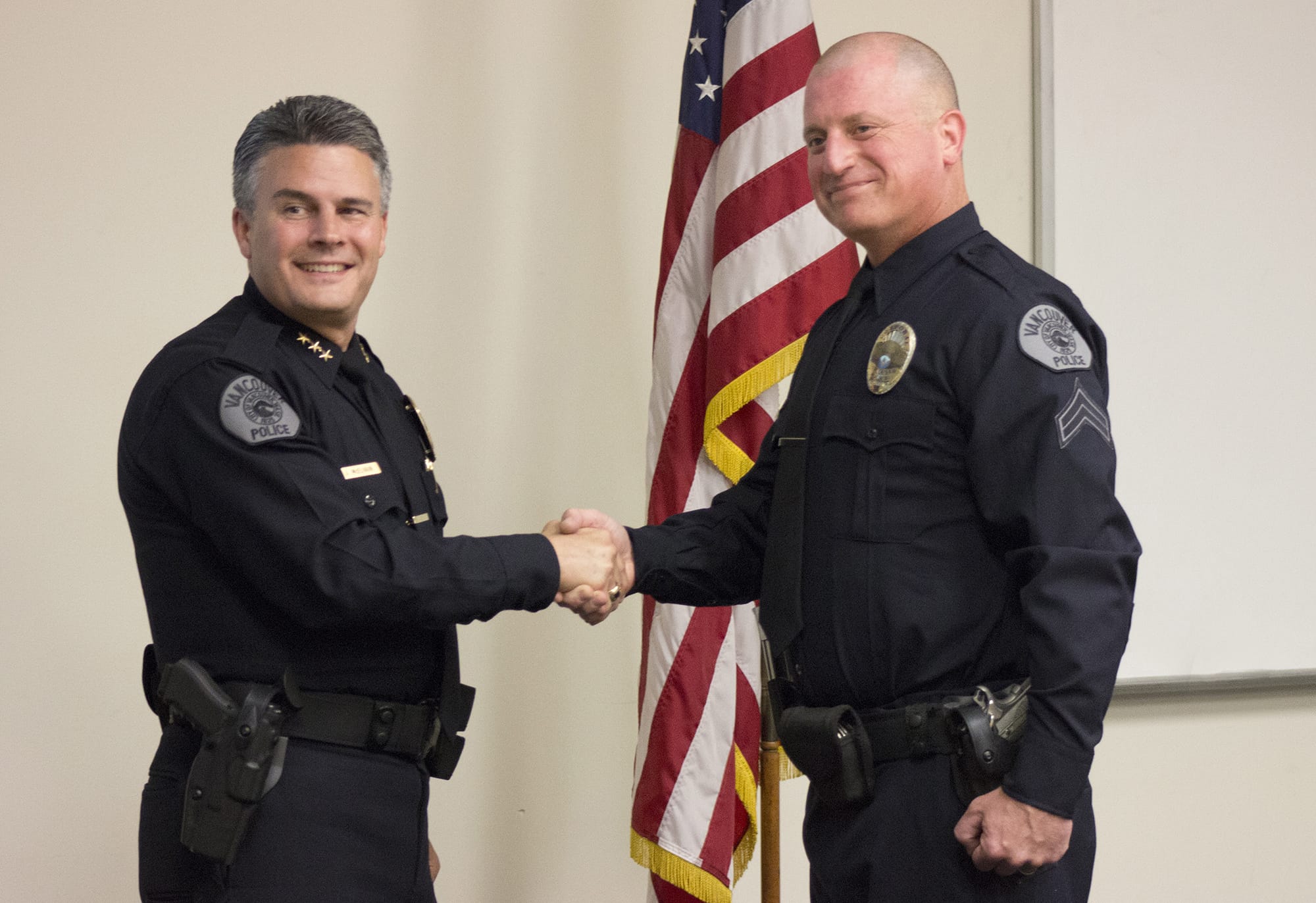Friday’s promotion ceremony at the Vancouver Police Department’s west precinct was newsworthy for two reasons: By elevating an officer to the rank of corporal, Chief James McElvain again illustrated he’s willing to promote from within, and by doing so he chipped away at long-held concerns about room for advancement in the department.
Second, the officer promoted was Aaron Gibson, whose career has been an example of the good that can come from a second chance.
Gibson, 46, was fired in December 1997 for leaving behind three reload shells for flash-bang grenades at a SWAT training site in August of that year. The devices are used as a diversionary tactic and to scare suspects. The forgotten shells were discovered by a 13-year-old girl, who picked one up and detonated it. She blew off her right hand, and later received $800,000 from the city.
Gibson returned to work in October 1998, having been awarded his job back by a Seattle arbitrator who amended his punishment to a 60-day suspension without pay.
While he was able to return to a job he loved, the accident wasn’t one he could forget.
“Pretty much every day for a couple of years I’d wake up with regret and frustration,” Gibson said during an interview last week. “It just dogged me.”
For the past five years, Gibson has been the department’s range master. In that capacity, details cannot be overlooked. Among other duties, the range master keeps a database with serial numbers for 500-plus firearms (both department-owned and officers’ private firearms) and knows where those firearms are at all times. He schedules and oversees firearms training and tests weapons to make sure they are working properly. Gibson also worked with city attorneys to ensure training would be legally defensible should an officer’s abilities be questioned, and worked with officers to make sure they followed chain of custody protocol in handling firearms that are used during a call.
When McElvain promoted Cpl. Chad Williams to sergeant this spring, Gibson said he felt ready for a new challenge. An initial screening of eligible officers produced 12 semifinalists, who were ranked according to how well they did on a written essay and in an oral interview. The top three candidates landed interviews with McElvain. Gibson was ranked No. 1.
Gibson has a reputation for being well-organized and handling varied responsibilities, McElvain said. He wasn’t an officer he felt he could pass over for a promotion.
McElvain noted Friday that Gibson was the eighth promotion he’s made in eight months on the job.
“The rank of corporal is the first step into the realm of supervisory responsibilities,” he said. By promoting Williams to sergeant, he wanted to send a message that he values corporals, he said, and reassure officers he’ll look within the department to fill vacancies.
The 190-officer department has 16 corporals.
Gibson’s annual salary will increase from $79,236 to $86,004, said Suzi Hagstrom, the city’s director of human resources.
The lowest point
Gibson wasn’t the only one found at fault in 1997. Another officer, Steve Neal, now a lieutenant who co-commands the Southwest Washington Regional SWAT team, received a 45-day suspension without pay. Doug Maas, the police chief at the time, had his pay cut by 5 percent. The department was fined $4,500 by the state Department of Labor and Industries for failing to follow state law in using and storing explosive devices.
In 1999, the city settled a legal claim with the teenager’s family for $800,000.
Gibson’s firing was contested by the Vancouver Police Officers Guild.
David Snyder, a Portland attorney who has represented the guild since 1992, said the main thing that stands out all these years after the four-day arbitration hearing was department policies were found to be lacking. It was a learning experience for the city, too.
This was before the creation of the Southwest Washington Regional SWAT team, which Gibson called “leaps and bounds” ahead of the team the Vancouver department had operated.
During arbitration hearings, Snyder argued that Gibson was made the scapegoat. While city attorneys portrayed Gibson in the most unflattering way possible, Snyder argued if police management felt Gibson was really a problem, it was not well documented in his personnel file.
“Aaron has not been in trouble since then,” Snyder said last week. “He’s highly respected in the department as a hard worker with great integrity.”
Lt. Scott Creager was the first officer on the scene Aug. 12, 1997, when the teenager blew off her hand at the abandoned Liberty Court Apartments. The city had purchased the property to make room for the Mill Plain Boulevard extension, and SWAT officers used the boarded-up complex for training. The property was marked with “No Trespassing” signs, but the teenager climbed a tree, went through a second-story window and found the shells.
Creager attended Friday’s ceremony.
“I’m glad to see him get promoted,” Creager said. “Aaron owned his part. No one could say he didn’t.”
The worst part of the accident, of course, was that a young girl suffered a horrible, disfiguring injury. But if a silver lining can be found, it’s that Gibson learned how to slow down and pay attention, he said.
He’s also more empathetic. These lessons have made him a better police officer, a better husband and a better father, he said. He has five daughters, ranging in age from 26 to 3, and two grandsons.
The accident was the seminal negative event of his 25-year law enforcement career.
“I can’t say I think about it every day anymore,” he said. “But I think it’s been imprinted in my work ethic.”



